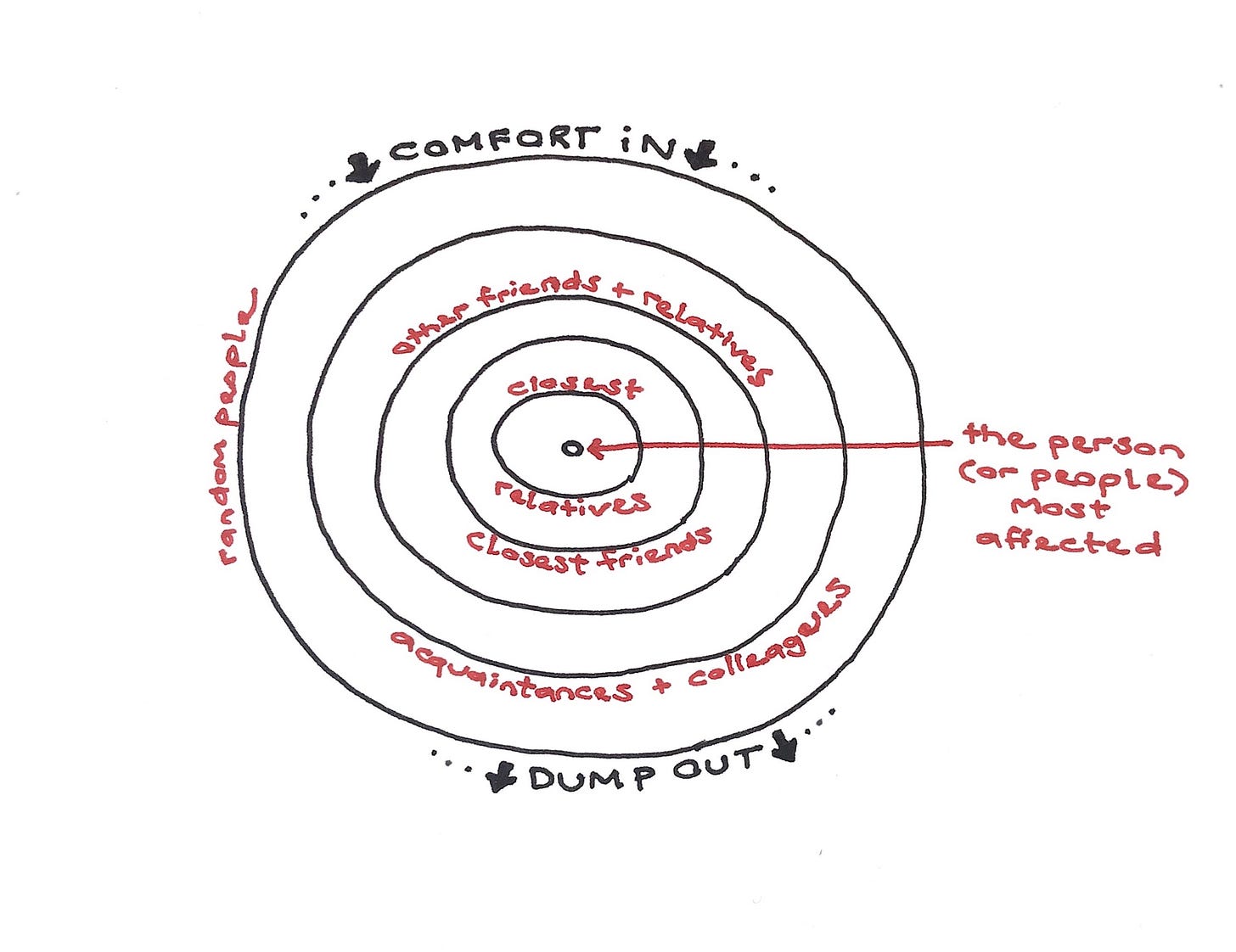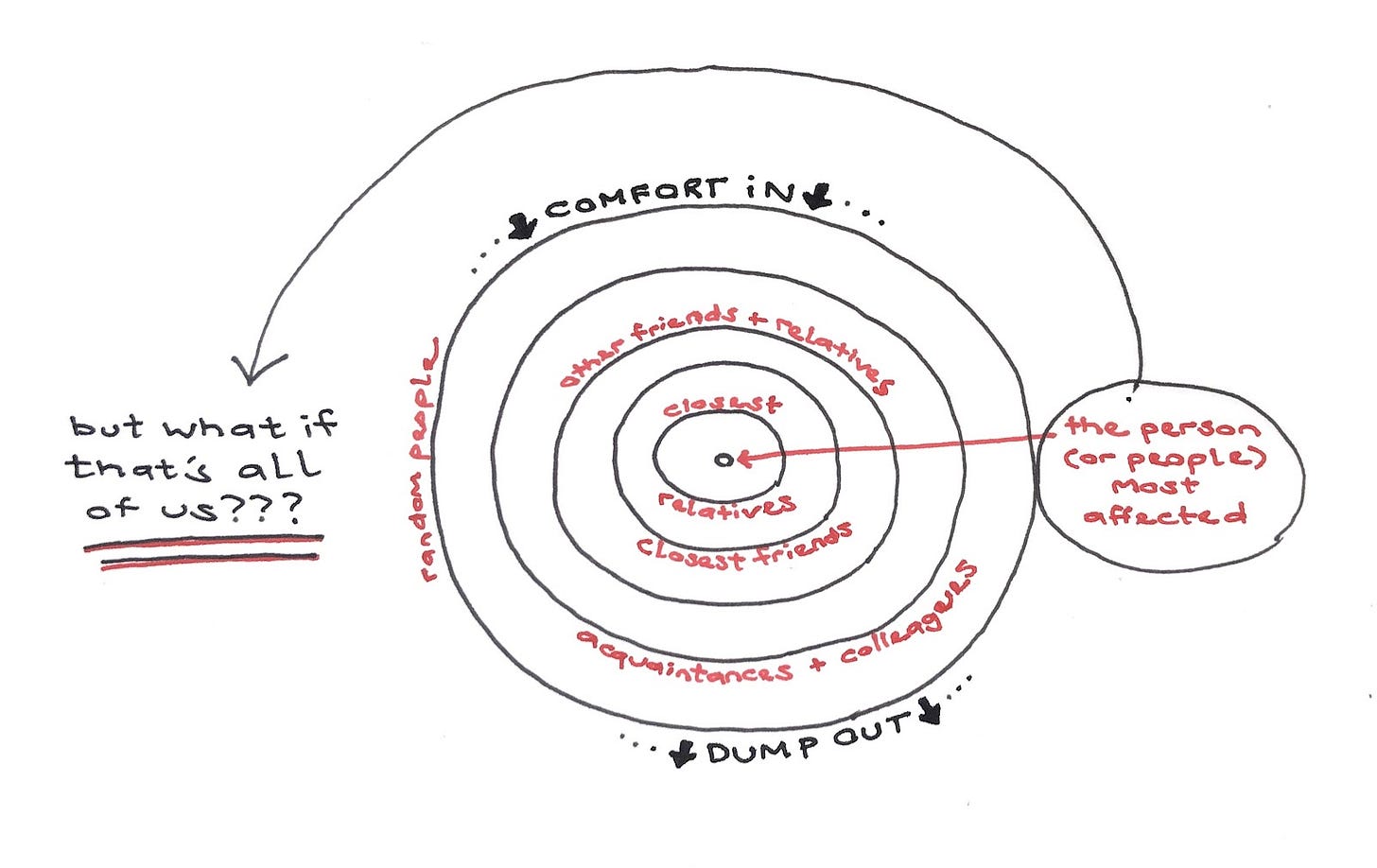Does the Ring Theory work in a pandemic?
We all need someone to dump on.

Not long after my husband died, someone sent me an incredibly helpful Los Angeles Times article. I can’t remember who sent it to me—a lot of people were sharing loads of advice and resources at the time—but I do remember how quickly it clicked. Yes! I thought. This is going to help me and so many people who are hurting right now.
The article introduced the Ring Theory. The idea is that, when someone is going through an especially difficult time, they can vent to or lean on anyone else who is less affected in that moment. The less affected people should avoid venting to or leaning on the more affected people; instead, they should seek out someone even less affected than them.
Clinical psychologist Susan Silk and her friend Barry Goldman wrote about the Ring Theory. Here’s how they explained it:
The person in the center ring can say anything she wants to anyone, anywhere. She can kvetch and complain and whine and moan and curse the heavens and say, “Life is unfair” and “Why me?” That’s the one payoff for being in the center ring.
Everyone else can say those things too, but only to people in larger rings.
When you are talking to a person in a ring smaller than yours, someone closer to the center of the crisis, the goal is to help. Listening is often more helpful than talking. But if you’re going to open your mouth, ask yourself if what you are about to say is likely to provide comfort and support. If it isn’t, don’t say it. Don’t, for example, give advice. People who are suffering from trauma don’t need advice. They need comfort and support. So say, “I’m sorry” or “This must really be hard for you” or “Can I bring you a pot roast?” Don’t say, “You should hear what happened to me” or “Here’s what I would do if I were you.” And don’t say, “This is really bringing me down.”
If you want to scream or cry or complain, if you want to tell someone how shocked you are or how icky you feel, or whine about how it reminds you of all the terrible things that have happened to you lately, that’s fine. It’s a perfectly normal response. Just do it to someone in a bigger ring.
The article was accompanied by a diagram with words that became a grief motto for me: Comfort in, dump out.
When Jamie died, I was at the center of that crisis, and Jamie’s parents were too; it wasn’t appropriate for me to complain or dump on them, nor would it have been right for them to do that to me. Thankfully, we had plenty of other people to comfort us and share our feelings with.
The Ring Theory allowed me to set healthy boundaries early on and pass along the idea to others. At this point, those rings have pretty much evaporated. Losing Jamie still hurts—it always will—but I no longer need the support I used to.
Now we’re experiencing another trauma. This time, it’s much different.

When it comes to the coronavirus pandemic and its wide-ranging effects, I consider myself incredibly fortunate. I don’t know anyone who’s seriously ill or has died from the virus. I’ve been able to find and maintain steady sources of income. I can easily work from home, and don’t have to juggle work while also caring for a child. I live with a loving and supportive partner, in a house with a backyard and a porch. I am safe, and have lots to be grateful for.
Still, I worry about the future. I have trouble sleeping sometimes. I get anxious and fall down what-if rabbit holes. I miss my dog and can get really lonely. I wonder how long it will be until I can see my family. I have days when I need to kvetch and complain and whine and moan and curse the heavens.
But none of what I’m experiencing registers on the scale of what other people are facing. Right now, we are all collectively experiencing the effects of COVID-19, and all of the grief, anxiety, and uncertainty that comes with it. We are all dealing with different circumstances, and responding to those circumstances in different ways. And while I think it’s important not to compare our experiences with grief and trauma, it’s also important to know who you can vent to and lean on when times get tough. Because we’re all at the center of our own rings, it’s not entirely clear who we can complain to when we’re feeling overwhelmed.
That’s why, a few weeks ago, I returned to therapy. Dr. B and I reunited via video, in a world that looked a lot different than the last time we spoke.
I felt good about my choice to step away from therapy late last year. I viewed it as a sign of personal progress and growth. That doesn’t mean I feel bad about seeking out my therapist again. I know it’s not a sign of regression or weakness. If anything, it’s a sign of the times.
During therapy sessions, I’m able to vent without fear of being a burden. Dr. B is undoubtedly affected by the pandemic, but that’s not for me to worry about. Like any good therapist, Dr. B sits firmly at my outermost ring. She’s someone I can regularly dump my feelings onto, always there to provide comfort. It’s her job to do that.
It makes me angry that therapy is a luxury—something that many people can’t afford, or have easy access to. (Dr. B agreed to do sessions at a lower cost; it’s worth asking if your therapist can do the same.) We can all benefit from having someone in that prized outermost ring.
If therapy isn’t an option, there are still ways to honor the Ring Theory and get the support you need. One suggestion is to set up a recurring group call or video chat with a small circle of trusted friends. Give each person a chance to vent and everyone else the opportunity to listen and comfort (don’t let one friend dominate the conversation!). By making it a shared, collective effort, the burden becomes less to shoulder.
There’s also a chance that you can be that outer-ring person for someone else, and vice versa. Someone who is worried about money can vent to a friend who’s more financially stable. During that conversation, the financially stable friend’s job will be to listen and provide comfort. Later on, that person could vent to someone else about a sick loved one. The same rules apply: Comfort in, dump out.
Lately, my closest friends and I have started conversations by asking, “How are you right now?” or “Are you in a spot where I can rant a little?” If they have the capacity to listen and comfort, that’s wonderful. If not, that’s totally understandable. I’ll save my gripes for Dr. B or another day.
No matter how you do it, I hope you find someone in an outer ring to talk to. Likewise, I hope you can be someone else’s source of support. If you’re in a good spot today, consider reaching out to a friend or relative who might need a place to dump. We all need a bit of comfort right now.
xoxo,
KHG
This newsletter is written by Katie Hawkins-Gaar. Today’s issue was guest edited by Billy Mays III, who’s a good editor and an even better musician. You can check out his work here.



I really like this model and would hope that folks would use this when frustrated w restrictions imposed by Covid (also think it is a great model in general).